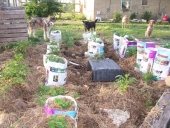ya, I'd like to make another vote for snakes, they eat slugs, insects, mice, and several other plant eaters.
garter snakes can be quite cold hardy, don't know how far north you are in alberta, but they cover most of it.
Also by creating a habitat for them you'll be doing great service for the environment and local ecology,
since much of their habitat was destroyed by urbanization, and agricultural fields,
so it is a system out of balance, and if you don't want to wait till the next ice age,
when some rocks might dig themselves into the soil, you'll have to make your own snake habitat.
The main thing you have to do before getting the snakes, is making a winter shelter for them, called a hibernaculum.
It's more sophisticated than just some rocks, gotta be below frost line, at least 2 meters deep, in sunny, low-wind area
here are a few links with descriptions and diagrams of hibernacula.
http://www.torontozoo.com/adoptapond/snakehibernacula.asp
http://www.longpointlandtrust.ca/pdf/Snakehi.pdf
If you have seen them in the area, may be able to just build it, and they'll come.
If not, can gather some from where they are abundant in the wild, or get them as pets and introduce them to your area,
assuming you have enough food (slugs, insects) and the hibernacula set up right they'll thrive.








